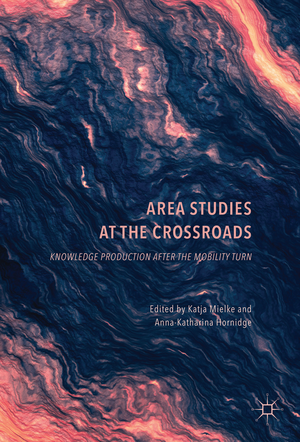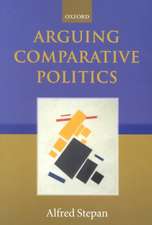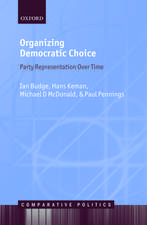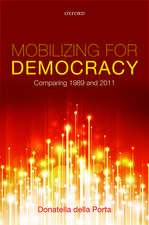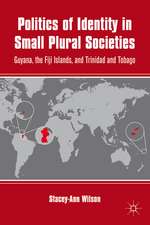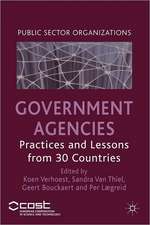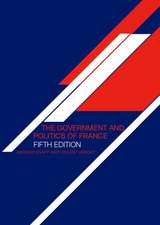Area Studies at the Crossroads: Knowledge Production after the Mobility Turn
Editat de Katja Mielke, Anna-Katharina Hornidgeen Limba Engleză Hardback – 2 mar 2017
| Toate formatele și edițiile | Preț | Express |
|---|---|---|
| Paperback (1) | 1110.96 lei 6-8 săpt. | |
| Palgrave Macmillan US – 12 dec 2018 | 1110.96 lei 6-8 săpt. | |
| Hardback (1) | 1302.60 lei 6-8 săpt. | |
| Palgrave Macmillan US – 2 mar 2017 | 1302.60 lei 6-8 săpt. |
Preț: 1302.60 lei
Preț vechi: 1588.53 lei
-18% Nou
Puncte Express: 1954
Preț estimativ în valută:
249.29€ • 259.30$ • 205.80£
249.29€ • 259.30$ • 205.80£
Carte tipărită la comandă
Livrare economică 15-29 aprilie
Preluare comenzi: 021 569.72.76
Specificații
ISBN-13: 9781349950119
ISBN-10: 1349950114
Pagini: 256
Ilustrații: XXIII, 363 p. 13 illus., 6 illus. in color.
Dimensiuni: 148 x 210 x 27 mm
Greutate: 6.0099999999999998 kg
Ediția:1st ed. 2017
Editura: Palgrave Macmillan US
Colecția Palgrave Macmillan
Locul publicării:New York, United States
ISBN-10: 1349950114
Pagini: 256
Ilustrații: XXIII, 363 p. 13 illus., 6 illus. in color.
Dimensiuni: 148 x 210 x 27 mm
Greutate: 6.0099999999999998 kg
Ediția:1st ed. 2017
Editura: Palgrave Macmillan US
Colecția Palgrave Macmillan
Locul publicării:New York, United States
Cuprins
I Area Studies at the Crossroads.- 1. Introduction: Knowledge Production, Area Studies and the Mobility Turn.- 2. The Neoliberal University and Global Immobilities of Theory.- II To Be or Not to Be Is Not the Question. Rethinging Area Studies in Its Own Right.- 3. Doing Area Studies in the Americas and Beyond. Towards Reciprocal Methodologies and the Decolonization of Knowledge.- 4. Area Studies @ Southeast Asia: Alternative Areas vs Alternatives to Areas.- 5. Between Ignoring and Romanticizing: The Position of Area Studies in Policy Advice.- III Knowledge Production after the Mobility Turn.- 6. Positionality and the Relational Production of Place in the Context of Student Migration to Gilgit, Pakistan.- 7. Red Lines for Uncivilized Trade?: Fixity, Mobility and Positionality on Almaty's Changing Bazaars.- 8. Margins or Centre? Konkani Sufis, India and 'Arabastan'.- IV From Local Realities to Concepts and Theorizing.- 9. The Role of Area Studies in Theory Production. A Differentiation of Mid-Range Concepts and the Example of Social Order.- 10. The Production of Knowledge in the Field of Development and Area Studies: From Systems of Ignorance to Mid-Range Concepts for Global Ethnography.- 11. New Area Studies, Translation and Mid-Range Concepts.- 12. Mid-Range Concepts - The Lego Bricks of Meaning-Making. An Example from Khorezm, Uzbekistan.- V De-Streamlining Academic Society: Pedagogy and Teaching.- 13. The Case for Reconceptualizing Southeast Asian Studies.- 14. This Area is [Not] Under Quarantine: Rethinking Southeast/Asia through Studies of the Cinema.- 15. Teaching to Transgress: Crossroads Perspective and Adventures in (?)-Disciplinarity.- VI Anticipating the Future of Area Studies.- 16. Are Transregional Studies the Future of Area Studies?.- 17. Reflecting the Moving Target of Asia.- 18. The Art of Science Policy for 21st Century Area Studies: Concluding Reflections
Recenzii
“Area Studies at the Crossroads can be recommended for any scholars (and institutional libraries) working not only in Asian/ Southeast Studies but also area studies generally.” (Paul Vickers, Connections, May 16, 2020)
Notă biografică
Katja Mielke (Dr. phil.) is Senior Researcher at the Germany-based think tank BICC, a peace and conflict research institute in Bonn. Trained in Social Sciences, East European, and Central Asian Studies, she was one of the initiators of the Germany-wide research network ‘Crossroads Asia’ for rethinking area studies.
Anna-Katharina Hornidge (Dr. phil.) is Professor of Social Sciences at the University of Bremen, Germany, as well as Head of Department of Social Sciences and of the Working Group ‘Development and Knowledge Sociology’ at the Leibniz-Center for Tropical Marine Research (ZMT), Germany. Trained in Sociology and Southeast Asian Studies, she scientifically coordinated ‘Crossroads Asia’ from 2012 to 2014 and was responsible for designing the networks strategy for synthesizing the conducted research. Today, she remains part of the Executive Board of the network.
Anna-Katharina Hornidge (Dr. phil.) is Professor of Social Sciences at the University of Bremen, Germany, as well as Head of Department of Social Sciences and of the Working Group ‘Development and Knowledge Sociology’ at the Leibniz-Center for Tropical Marine Research (ZMT), Germany. Trained in Sociology and Southeast Asian Studies, she scientifically coordinated ‘Crossroads Asia’ from 2012 to 2014 and was responsible for designing the networks strategy for synthesizing the conducted research. Today, she remains part of the Executive Board of the network.
Textul de pe ultima copertă
In this pioneering volume, leading scholars from a diversity of backgrounds in the humanities, social sciences, and different area studies argue for a more differentiated and self-reflected role of area-based science in global knowledge production. Considering that the mobility of people, goods, and ideas make the world more complex and geographically fixed categories increasingly obsolete, the authors call for a reflection of this new dynamism in research, teaching, and theorizing. The book thus moves beyond the constructed divide between area studies and systematic disciplines and instead proposes methodological and conceptual ways for encouraging the integration of marginalized and often overseen epistemologies. Essays on the ontological, theoretical, and pedagogical dimension of area studies highlight how people’s everyday practices of mobility challenge scholars, students, and practitioners of inter- and transdisciplinary area studies to transcend the cognitive boundaries thatscholarly minds currently operate in.
Caracteristici
Brings together an international group of scholars engaged in conducting ‘new’ Area Studies at the verge of disciplines and in inter- and transdisciplinary centers, research networks, and projects Provides reflections on theory-building from empirical realities in an effort to systematically tackle the constructed divide between Area Studies and disciplines Proposes future Area Studies as politically-aware, differentiated, emancipatory, analytical Area Studies in mobile and multi-sited, interdisciplinary contexts
